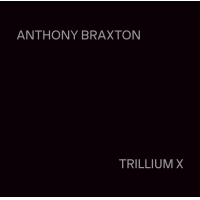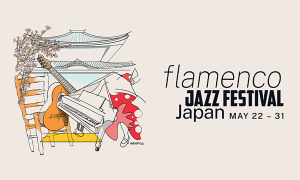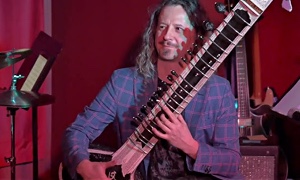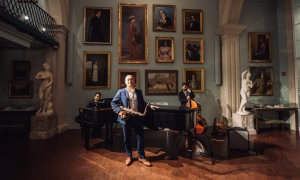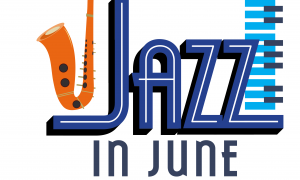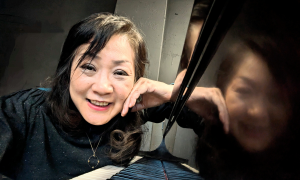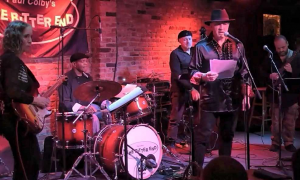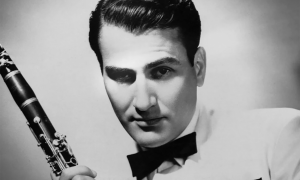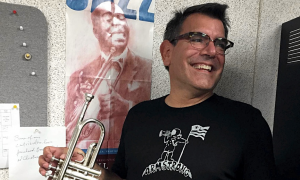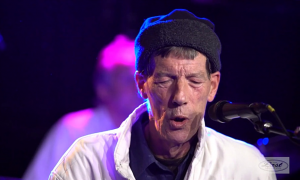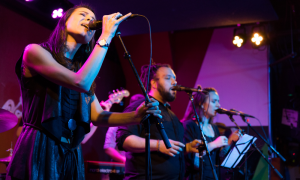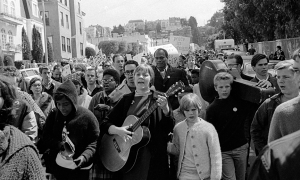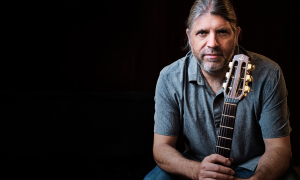Trillium X represents the sixth installment in Anthony Braxton’s expansive opera cycle, Trillium, a project he has been developing since the 1990s. Trillium X delves into themes of metaphysics, mysticism, and human consciousness, unfolding across four exploratory dream spaces with an imaginatively conceived narrative logic.
—PMP Label
In 2025, PMP is proud to release Trillium X, a sixth opera by Anthony Braxton , on the occasion of his 80th birthday. A limited deluxe 8-CD box set including both, a live recording of the world premiere in Prague, a studio recording realized at the famous Darmstadt Summer Course, and with 6-hours of exclusive audio-visual materials documented a complete world premiere, the documentary film In the Garden of Trillium X, and in-depth conversation between Anthony Braxton, Swiss conductor Roland Dahinden and German writer and Braxton's scholar Timo Hoyer.
Braxton spent five years working on his opus magnum. He has been significantly involved in all Trillium performances, including this one. He has accompanied the rehearsals from the very beginning. However, the leading man in charge was Roland Dahinden, his long-time fellow from Wesleyan University. Dahinden and the incredible PMP Orchestra represent the ongoing generational change in creative music.
Edit-Stein-Schule, Darmstadt, Germany (CD 5-8) on 3rd and 4th August 2023
Exclusive audio-visual materials documented the complete world premiere, the documentary film In the Garden of Trillium X, and an in-depth conversation between Anthony Braxton, Swiss conductor Roland Dahinden and German writer and Braxton's scholar Timo Hoyer.
He is highly esteemed in the experimental music community for the revolutionary quality of his work and for the mentorship and inspiration he has provided to generations of younger musicians. His work, both as a saxophonist and a composer, has broken new conceptual and technical ground in the trans-African and trans-European (a.k.a. “jazz” and “American Experimental”) musical traditions in North America as defined by master improvisers such as Warne Marsh, John Coltrane, Paul Desmond, Ornette Coleman, Albert Ayler, and he and his own peers in the historic Association for the Advancement of Creative Musicians (AACM, founded in Chicago in the late ‚60s); and by composers such as Charles Ives, Harry Partch, and John Cage.
He has further worked his own extensions of instrumental technique, timbre, meter and rhythm, voicing and ensemble make-up, harmony and melody, and improvisation and notation into a personal synthesis of those traditions with 20th-century European art music as defined by Schoenberg, Stockhausen, Xenakis, Varese and others. From his early work as a pioneering solo performer in the late 1960s through to his eclectic experiments on Arista Records in the 1970s, his landmark quartet of the 1980s, and more recent endeavors, such as his cycle of Trillium operas and the day-long, installation-based Sonic Genome Project, his vast body of work is unparalleled.
His small ensembles of the 1970s through to the present day are considered among the most innovative groups of their respective eras, while his Creative Orchestra Music has brought together the varying streams of American jazz orchestras, marching bands, and experimental practices with the traditions of European concert music in a wholly individual compositional voice. He toured and recorded as a soloist on flute, saxophones, and clarinets, as well as with his quartets, which included (in the 1970s) bassist Dave Holland and trombonist George Lewis}}, and (in the 1980s) pianist Marilyn Crispell and drummer Gerry Hemingway. He also worked with pianists Dave Brubeck, Muhal Richard Abrams.
His continuing and evolving current systems of the past 15 years, including Ghost Trance Music, Diamond Curtain Wall Music, Falling River Music, Echo Echo Mirror House Music, and ZIM Music, have served as the artistic incubators for some of the most exciting artists of the current generation.
Braxton taught at Mills College in Oakland, California (1985–88), and at Wesleyan University, Middletown, Connecticut (1990–2013). In 1994 he founded the Tri-Centric Foundation, which maintained his archives and later released recordings under the Braxton House and the New Braxton House labels. Braxton’s many awards include a 1981 Guggenheim Fellowship, a 1994 MacArthur Fellowship, a 2013 Doris Duke Performing Artist Award, a 2014 NEA Jazz Master Award, and honorary doctorates from Université de Liège (Belgium), New England Conservatory (USA) and the 2020 United States Artists Fellowship.
Note: Mr. Braxton is the Artistic Director of the non-profit Tri-Centric Foundation, formed in 1994, that seeks to preserve and distribute Anthony Braxton's work through recordings, performances, workshops and lectures
The PMP Ensemble I Orchestra members share a passion for interdisciplinary and super-genre music. The PMP Ensemble I Orchestra on different forms of controlled improvisation, and combines classical notation with graphic scores, notated, aleatoric as well as completely improvised passages. Under the artistic direction of Roland Dahinden, the musicians work in close collaboration with composers and world-renowned musicians. The international orchestra includes leading representatives of the experimental and improvisational scene (Marcel Bárta, George Cremaschci, Radim Hanousek, Didrik Ingvaldsen, Andrea La Rose, Michal Wróblewski, etc.).
In 2021-2022, the orchestra performed Anthony Braxton’s improvisational pieces Language Types, No. 174, No. 136, and No. 257, that had been practised for during the workshops under the baton of Roland Dahinden.
New pieces are also commissioned for, and performed by the PMP Ensemble I Orchestra. In 2022, the PMP Ensemble I Orchestra performed the arrangement of WHA-WHA by Roscoe Mitchell, who also accepted the invitation to arrive in Prague and performed with his quintet in the Archa Theatre. During this evening, together with a Filipino-American saxophonist Jon Irabagon as the soloist and Roland Dahinden as the conductor, The PMP Ensemble I Orchestra performed the arrangement in the world premiere. Prior to the concert, it was Roland Dahinden again, who led a few days’ workshop on improvisation with the orchestra.
In 2023, the PMP Orchestra performed the world premiere of Anthony Braxton's Trillium X under the direction of the composer. The orchestra was invited to record and perform at the International Summer Courses in Darmstadt in August.
Braxton spent five years working on his opus magnum. He has been significantly involved in all Trillium performances, including this one. He has accompanied the rehearsals from the very beginning. However, the leading man in charge was Roland Dahinden, his long-time fellow from Wesleyan University. Dahinden and the incredible PMP Orchestra represent the ongoing generational change in creative music.
Trillium X Personnel
- Hildegard Kleeb – piano
- Soloists: Eva Esterková, Aleš Janiga, Elmaz Mrkvičková, František Sliž, Jana Vondrů, Martin Kotulan, Michael Robotka, Anežka Matoušková, Andrea Pietrová, Vojtěch Šembera, Barbora Jirásková, Štěpán Janoušek.
- PMP Orchestra; Rolald Dahinden – conductor
Edit-Stein-Schule, Darmstadt, Germany (CD 5-8) on 3rd and 4th August 2023
Exclusive audio-visual materials documented the complete world premiere, the documentary film In the Garden of Trillium X, and an in-depth conversation between Anthony Braxton, Swiss conductor Roland Dahinden and German writer and Braxton's scholar Timo Hoyer.
About Anthony Braxton
For over half a century, the African-American Anthony Braxton (born June 4, 1945, Chicago) has been one of the key figures in contemporary avant-garde music as a composer, multi-instrumentalist, music theorist, university teacher, mentor and visionary. Braxton himself calls his transidiomatic music “creative music”, which draws inspiration equally from jazz, European art music and the music of different world cultures. His oeuvre comprises around 700 compositions, over 200 albums and eight theoretical books.He is highly esteemed in the experimental music community for the revolutionary quality of his work and for the mentorship and inspiration he has provided to generations of younger musicians. His work, both as a saxophonist and a composer, has broken new conceptual and technical ground in the trans-African and trans-European (a.k.a. “jazz” and “American Experimental”) musical traditions in North America as defined by master improvisers such as Warne Marsh, John Coltrane, Paul Desmond, Ornette Coleman, Albert Ayler, and he and his own peers in the historic Association for the Advancement of Creative Musicians (AACM, founded in Chicago in the late ‚60s); and by composers such as Charles Ives, Harry Partch, and John Cage.
He has further worked his own extensions of instrumental technique, timbre, meter and rhythm, voicing and ensemble make-up, harmony and melody, and improvisation and notation into a personal synthesis of those traditions with 20th-century European art music as defined by Schoenberg, Stockhausen, Xenakis, Varese and others. From his early work as a pioneering solo performer in the late 1960s through to his eclectic experiments on Arista Records in the 1970s, his landmark quartet of the 1980s, and more recent endeavors, such as his cycle of Trillium operas and the day-long, installation-based Sonic Genome Project, his vast body of work is unparalleled.
His small ensembles of the 1970s through to the present day are considered among the most innovative groups of their respective eras, while his Creative Orchestra Music has brought together the varying streams of American jazz orchestras, marching bands, and experimental practices with the traditions of European concert music in a wholly individual compositional voice. He toured and recorded as a soloist on flute, saxophones, and clarinets, as well as with his quartets, which included (in the 1970s) bassist Dave Holland and trombonist George Lewis}}, and (in the 1980s) pianist Marilyn Crispell and drummer Gerry Hemingway. He also worked with pianists Dave Brubeck, Muhal Richard Abrams.
His continuing and evolving current systems of the past 15 years, including Ghost Trance Music, Diamond Curtain Wall Music, Falling River Music, Echo Echo Mirror House Music, and ZIM Music, have served as the artistic incubators for some of the most exciting artists of the current generation.
Braxton taught at Mills College in Oakland, California (1985–88), and at Wesleyan University, Middletown, Connecticut (1990–2013). In 1994 he founded the Tri-Centric Foundation, which maintained his archives and later released recordings under the Braxton House and the New Braxton House labels. Braxton’s many awards include a 1981 Guggenheim Fellowship, a 1994 MacArthur Fellowship, a 2013 Doris Duke Performing Artist Award, a 2014 NEA Jazz Master Award, and honorary doctorates from Université de Liège (Belgium), New England Conservatory (USA) and the 2020 United States Artists Fellowship.
Note: Mr. Braxton is the Artistic Director of the non-profit Tri-Centric Foundation, formed in 1994, that seeks to preserve and distribute Anthony Braxton's work through recordings, performances, workshops and lectures
About PMP Ensemble I Orchestra
The PMP Ensemble I Orchestra was founded in 2021, and its existence has been inevitably related to the Prague Music Performance Festival and Institute. The ensemble consists of some of the finest European musicians, who extensively travel both as soloists and musical group members with the Swiss trombonist and conductor Roland Dahinden as conductor. Throughout its short existence, the PMP Ensemble I Orchestra has performed pieces by acclaimed musicians and composers, such as Anthony Braxton or Roscoe Mitchell, both of whom came to Prague for this occasion. The idea of the ensemble is based on the experimental musical approach and unbridled musical creativity.The PMP Ensemble I Orchestra members share a passion for interdisciplinary and super-genre music. The PMP Ensemble I Orchestra on different forms of controlled improvisation, and combines classical notation with graphic scores, notated, aleatoric as well as completely improvised passages. Under the artistic direction of Roland Dahinden, the musicians work in close collaboration with composers and world-renowned musicians. The international orchestra includes leading representatives of the experimental and improvisational scene (Marcel Bárta, George Cremaschci, Radim Hanousek, Didrik Ingvaldsen, Andrea La Rose, Michal Wróblewski, etc.).
In 2021-2022, the orchestra performed Anthony Braxton’s improvisational pieces Language Types, No. 174, No. 136, and No. 257, that had been practised for during the workshops under the baton of Roland Dahinden.
New pieces are also commissioned for, and performed by the PMP Ensemble I Orchestra. In 2022, the PMP Ensemble I Orchestra performed the arrangement of WHA-WHA by Roscoe Mitchell, who also accepted the invitation to arrive in Prague and performed with his quintet in the Archa Theatre. During this evening, together with a Filipino-American saxophonist Jon Irabagon as the soloist and Roland Dahinden as the conductor, The PMP Ensemble I Orchestra performed the arrangement in the world premiere. Prior to the concert, it was Roland Dahinden again, who led a few days’ workshop on improvisation with the orchestra.
In 2023, the PMP Orchestra performed the world premiere of Anthony Braxton's Trillium X under the direction of the composer. The orchestra was invited to record and perform at the International Summer Courses in Darmstadt in August.
About PMP Label | Publishing House
PMP is a label and publishing house dedicated to contemporary, experimental, and classical music. Its primary mission is to actively foster a greater appreciation for often overlooked musical themes. PMP remains committed to its vision of expanding horizons and enriching the cultural landscape.For more information contact Vivo Musique Internationale.


